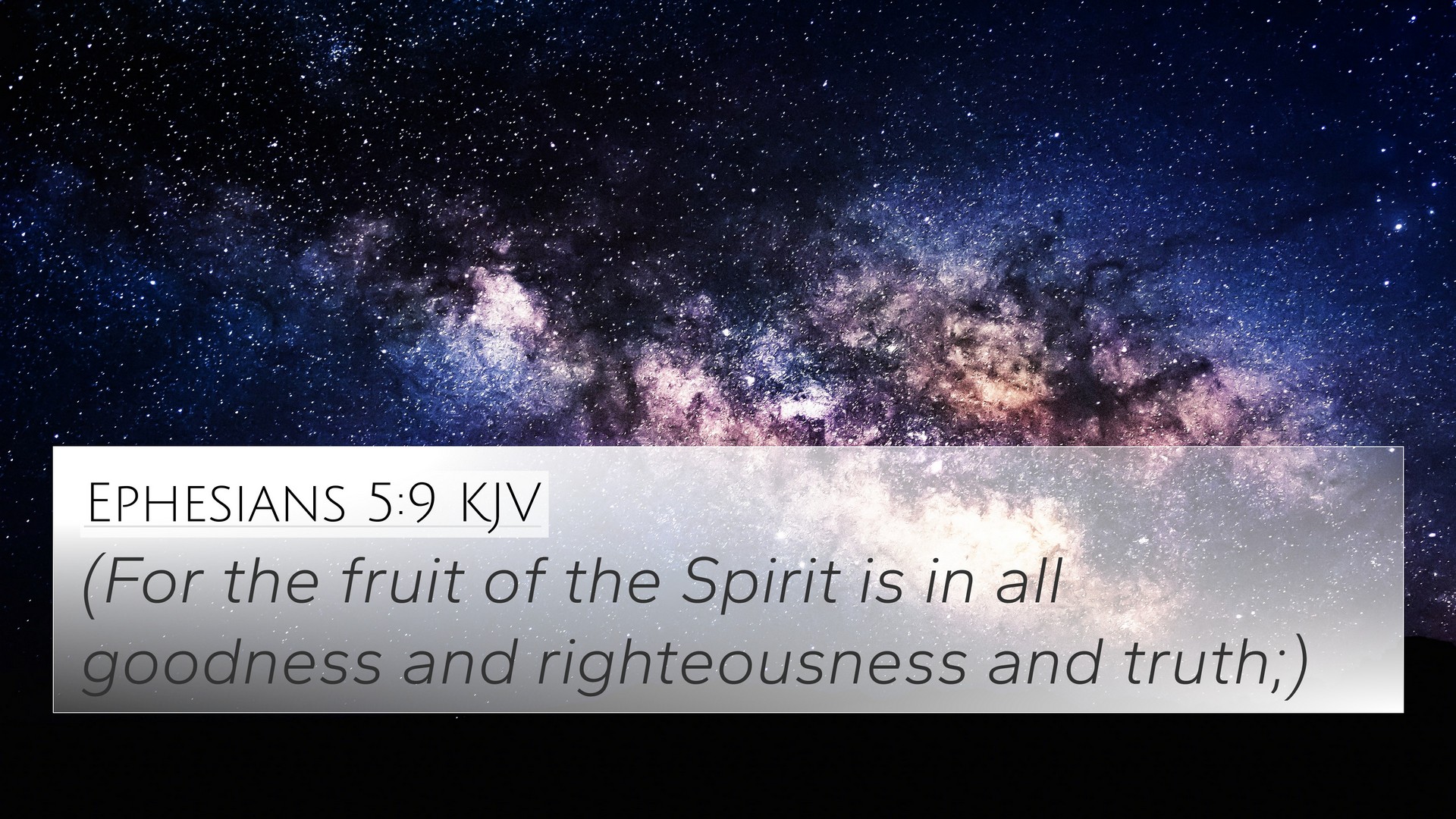Ephesians 5:9 - Understanding the Light Within Us
Ephesians 5:9 states: "For the fruit of the Spirit is in all goodness and righteousness and truth."
This verse emphasizes the characteristics that should define the life of a believer, highlighting the essence of a Christ-like existence.
Commentary Insights
Matthew Henry's Commentary
Matthew Henry discusses that the “fruit of the Spirit” represents the outward manifestation of inner spiritual life.
He emphasizes that true righteousness and goodness are not just actions but stem from the Spirit's transformative work in the believer's heart.
Albert Barnes' Notes on the Bible
Barnes points out that this verse lists “goodness” as part of the Spirit's fruit, which embodies a moral quality of being good and kind to others.
He also highlights that righteousness reflects a proper relationship with God and truth is essential for living in accordance with divine standards.
Adam Clarke's Commentary
Adam Clarke interprets this verse as a call for believers to embrace the characteristics of the Holy Spirit, hence producing "fruit" that is visible to all.
He stresses that the presence of the Holy Spirit results in a life that genuinely reflects goodness, righteousness, and truth, distinguishing believers in a world of moral ambiguity.
Thematic Connections
The themes present in Ephesians 5:9 can be connected to various other verses throughout the Scripture, which help illuminate its meaning further.
Below are some key Bible verse cross-references that illustrate these connections:
- Galatians 5:22-23 - Lists the fruit of the Spirit, echoing the themes of goodness and righteousness.
- Philippians 1:11 - Encourages believers to be filled with the fruits of righteousness.
- John 8:32 - Talks about truth, which sets us free and aligns with the message of Ephesians 5:9.
- Romans 14:17 - Discusses the kingdom of God comprising righteousness, peace, and joy in the Holy Spirit.
- 2 Corinthians 6:14 - Urges believers to live in righteousness, reinforcing the distinct nature of the Christian walk.
- 1 John 1:5 - States that God is light, and in Him, there is no darkness, relating to living in truth.
- James 3:17 - Describes the wisdom from above as pure, peaceable, gentle, and willing to yield, reflecting goodness.
- Colossians 1:10 - Encourages believers to walk in a manner worthy of the Lord, bearing fruit in every good work.
- Matthew 7:17 - Illustrates that good trees bear good fruit, paralleling the theme of kindness and goodness.
- Isaiah 5:20 - Warns against calling evil good and good evil, emphasizing the importance of understanding righteousness.
Understanding Inter-Biblical Dialogue
The connections between the verses above highlight the importance of scriptural cross-referencing when studying the Bible.
These Bible verse parallels allow for a deeper understanding of how themes such as goodness, righteousness, and truth resonate throughout the entirety of Scripture.
Tools for Bible Cross-Referencing
Utilizing a bible concordance or a bible cross-reference guide can help identify these connections effectively.
Here are some methods and resources for an enriched cross-referencing Bible study:
- Using Bible Concordances: Helps locate keywords and their occurrences throughout the Bible.
- Online Bible Tools: Various websites provide built-in cross-reference options to find related verses quickly.
- Study Bibles: Many editions include footnotes that reference similar verses and themes.
- Topical Bible Studies: Resources that categorize scriptures by themes for quicker reference.
Application and Reflection
To truly reflect on Ephesians 5:9, individuals are encouraged to assess their lives in light of the "fruit of the Spirit."
By cultivating goodness, righteousness, and truth, believers can effectively shine as lights in a world often obscured by darkness.
This verse serves as a reminder of our collective calling as followers of Christ to embody the characteristics of our Savior through the guidance of the Holy Spirit.
Conclusion
Ephesians 5:9 not only provides deep insight into the expected conduct of a believer but also offers a rich framework for understanding the connections and themes present in the Bible.
By leveraging these cross-references, individuals can uncover the multifaceted teachings of Scripture and enrich their spiritual journey.


















